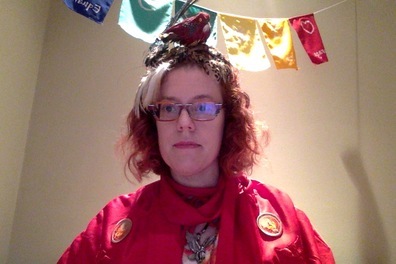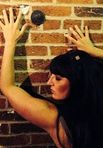Carpe Noctem Chapbook Interview With Sandra Faulkner
 Postkarten aus Deutschland/Postcards from Germany, Liminalities.net, 2016
Postkarten aus Deutschland/Postcards from Germany, Liminalities.net, 2016 THINGS WE’RE DYING TO KNOW…
Let’s start with the book’s title, Postkarten aus Deutschland/Postcards from Germany, and your cover image. How did you choose each? And, if I asked you to describe or sum up your book, what three words immediately come to mind?
I spent four months in Germany in Fall 2014 on sabbatical. I did not intend to work on poetry about that experience, but what poet can help herself? My fuzzy thoughts after a long plane ride and drive from Frankfurt to Mannheim was how traveling is liminal space. And this liminal space is a good topic for writing about. I noticed that even the light was different and gave another perspective on place. This collection is a feminist ethnography of place and embodiment in verse.
I did not choose the cover image until I was almost done with the project. I spent most of my time in Mannheim and southern Germany, but one long weekend I spent in Berlin. I found the Reichstag to be a fascinating space, and the image of it disorientating like jetlag.
This chapbook is like 1. Coffee hour (Kaffe Klatsch), 2. Disorderly Order, 3. A glass of Riesling
What were you trying to achieve with your book? Tell us about the world you were trying to create, and who lives in it.
I am a feminist poet and academic who lives her life as an ethnographer. This means that I am always analyzing life as a cultural project. I saw a call for work on cartographies near the end of my sabbatical, and I considered the journal I had been keeping with notes for poems. I had taken lots of photos. The idea for a chapbook of ethnographic poems sprang from the call for work on cartographies. I wanted to create a feminist ethnography of my experiences living in Germany with my spouse and child. I wanted to use images and sounds and play them off of text. So this world is that of an American woman who always wanted to live in Germany, but when she was able to check this off a list, she was married with a child, middle-aged, and a professor of communication. I do hope the collection resonates with a larger audience, however.
Can you describe your writing practice or process for this collection? Do you have a favorite revision strategy?
As a poet who also happens to be an ethnographer, I am always making notes for poems. I took a German for foreign speakers class twice a week in Mannheim. I made all kinds of notes in my class homework that later made it into the poems. When I realized that I wanted to write a series of poems about my time in Germany, I looked in my journal and class homework. I made notes for poems that I needed to write. I took bits of observations from my journal and homework as a starting point. I wrote poems, and then went into my collection of photos to see if there were images that spoke to the poetry I was writing, the themes that I saw coming out. In a few cases, I wrote a poem that spoke to a postcard I had created. I wanted to read the poems in my voice for the collection, and as I recorded the poems, I revised. This is a strategy I use with all of my writing. Read out loud. Revise. Read out loud. Revise.
How did you order the poems in the collection? Do you have a specific method for arranging your poems or is it sort of haphazard, like you lay the pages out on the floor and see what order you pick them back up in?
I worked back and forth with images—the postcards—and the poems I had written. I wanted to tell a story and considered how I could do that with images, sounds, and words. I made the postcards, and then I selected the poems that went with the images. A wrote more poems for some of the postcards I created.
What do you love to find in a poem you read, or love to craft into a poem you’re writing?
I love a poem that makes me stop thinking until the end, being so immersed in the world the poet has created that I can’t do anything but be in that space. I am not sure how to craft that into a poem, but I know that when I am working on a poem that ends up being a tiny world, I can’t think of anything but that poem.
Can you share an excerpt from your book? And tell us why you chose this poem for us to read – did it galvanize the writing of the rest of the collection? Is it your book’s heart? Is it the first or last poem you wrote for the book?
Ode to Jetlag
You can be in two places at once,
finally have the here and there
be the same in your fog of where
am I. The language you overhear,
sounds with no meaning,
could be your mother tongue,
English or Deutsch or just noise
you can’t see through,
a peripheral haze with no way
to filter in this place of the in-between
where you can make time warp
and erase the tedium of the everyday.
This poem is the first poem in the collection. It describes the space in which I was writing the poems, and the feminist ethnography in verse of my time living in Germany. This was the first poem I wrote, and it was also the poem that set the theme for what I wanted to do with the collection. I wanted to make the strange familiar, which is a technique that ethnographers often use in their work.
If you had to convince someone walking by you in the park to read your book right then and there, what would you say?
There are pictures! And sound. Really, I think the experience of this chapbook is like a good friend coming back from a trip and talking about her travels, the real travels. It is the story behind the postcards and Facebook postings that you only get over a cup of coffee or a two-finger pour of the good stuff. Best of all, it is free!
For you, what is it to be a poet? What scares you most about being a writer? Gives you the most pleasure?
I cannot not write. It is how I process the world. Oftentimes, the writing helps me figure out what I think about a situation. The most frightening thing is the thought of not writing. Sometimes I am miserable when I write, and I know that I am miserable when I don’t write. The pleasurable part is when I have created a world in my writing.
Are there other types of writing (dictionaries, romance novels, comics, science textbooks, etc.) that help you to write poetry?
Given that I am a relationship researcher, I often find that relationship theory and feminist texts help me. There is not poetry in them, but I like to create it.
What are you working on now?
I am working on an ethnography of women and running titled, Real Women Run. It is a memoir in research, poetry, and creative nonfiction.
I also am working on a series of poetry collages on MotherWork composed from family artifacts, feminist research, and systematic recollections, I use words and images to queer staid understandings of White middle-class mothering. The MotherWork collages serve as a kind of queer Pinterest scrapbook that critique and interrogate expectations and attitudes about what mothers should do, think, and feel. I am using images to push what text can do.
What book are you reading that we should also be reading?
The Chronology of Water by Lidia Yuknavitch
Without stopping to think, write a list of five poets whose work you would tattoo on your body, or at least write in permanent marker on your clothing, to take with you at all times.
Denise Duhamel
Kim Addonizio
Karen Craigo
Tim Siebles
Nicole Cooley
***
Download (or read) for free here!

 Sandra L. Faulkner is Director of Women’s, Gender and Sexuality Studies and Professor of Communication at BGSU. Her poetry appears in places such as Gravel, Literary Mama, Rat’s Ass Review, and damselfly.
Sandra L. Faulkner is Director of Women’s, Gender and Sexuality Studies and Professor of Communication at BGSU. Her poetry appears in places such as Gravel, Literary Mama, Rat’s Ass Review, and damselfly.She authored three chapbooks, Hello Kitty Goes to College (dancing girl press, 2012), Knit Four, Make One (Kattywompus, 2015), and Postkarten aus Deutschland (http://liminalities.net/12-1/postkarten.html). Sense published her memoir in poetry, Knit Four, Frog One (2014). She researches, teaches, and writes about relationships in NW Ohio where she lives with her partner, their warrior girl, and two rescue mutts. Visit her online at https://bgsu.academia.edu/SandraFaulkner.
Published on September 07, 2016 13:13
No comments have been added yet.



